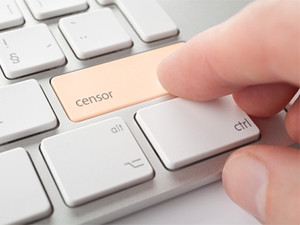
The Right2Know (R2K) Campaign is set to oppose amendments to the Films and Publications Act, which it argues will effectively censor the Internet. R2K will hold a protest next Wednesday.
In March, the Film and Publication Board (FPB) unveiled a draft Online Regulation Policy, which aims to more effectively regulate and classify digital content in SA. However, this move has been seen by some as the board's endeavour to police the Internet, with concerns being raised about online freedom of speech.
The FPB is a public entity that falls under the Department of Communications and was created to regulate the creation, production and distribution of films, games and 'certain publications' through classifications.
The draft policy will force Internet service providers and content generators to take more responsibility to ensure cyber safety, and assist in combating racism, hate speech and child pornography online.
After publication of the policy, the FPB announced it will this week start a series of public consultations, which will run until June. The first round was held yesterday in Cape Town.
However, R2K has taken umbrage with the proposed policy, and is calling on the public to reject the FPB's proposals to "censor" the Internet in South Africa. "The FPB wants broadly defined powers to police everything published on the Internet - including blogs, personal Web sites and Facebook pages, which amounts to censorship and is a violation of freedom of expression."
In addition, the civil society campaign demands the board "scrap" the policy, saying the FPB must "desist from any attempt to exercise pre-publication censorship of Internet content".
Concerns abound
R2K argues the policy requires anyone who wants to publish or distribute content to first apply for a digital publisher's online distribution agreement with the FPB, which will require a subscription fee. After that step, the publisher then has to submit the content to the FPB for classification before publishing. "This effectively is a specific form of pre-publication censorship, which is not acceptable."
In addition, says the civil society body, the time spent on pre-classifying content undermines one of the most valuable traits of the Internet - its immediacy.
"There is also a very real threat that in the future, organisations lacking in resources and unable to afford costly subscription fees, such as community-oriented news outlets and civil society groups, will be severely hampered by the unnecessarily bureaucratic regulations envisioned by the FPB. These online media outlets provide a valuable contribution to the diversity of the South African media landscape. The FPB draft regulations will disenable this diversity."
R2K is also worried the regulations allow the FPB to send classifiers to distributors' premises to classify digital content.
"The vague wording of the regulations would allow for 'classifiers' to visit, for example, the homes of citizen journalists and ordinary Internet users. Such sweeping powers reek of apartheid-era censorship, whose advocates similarly relied on the guise of moralising arguments.
Share